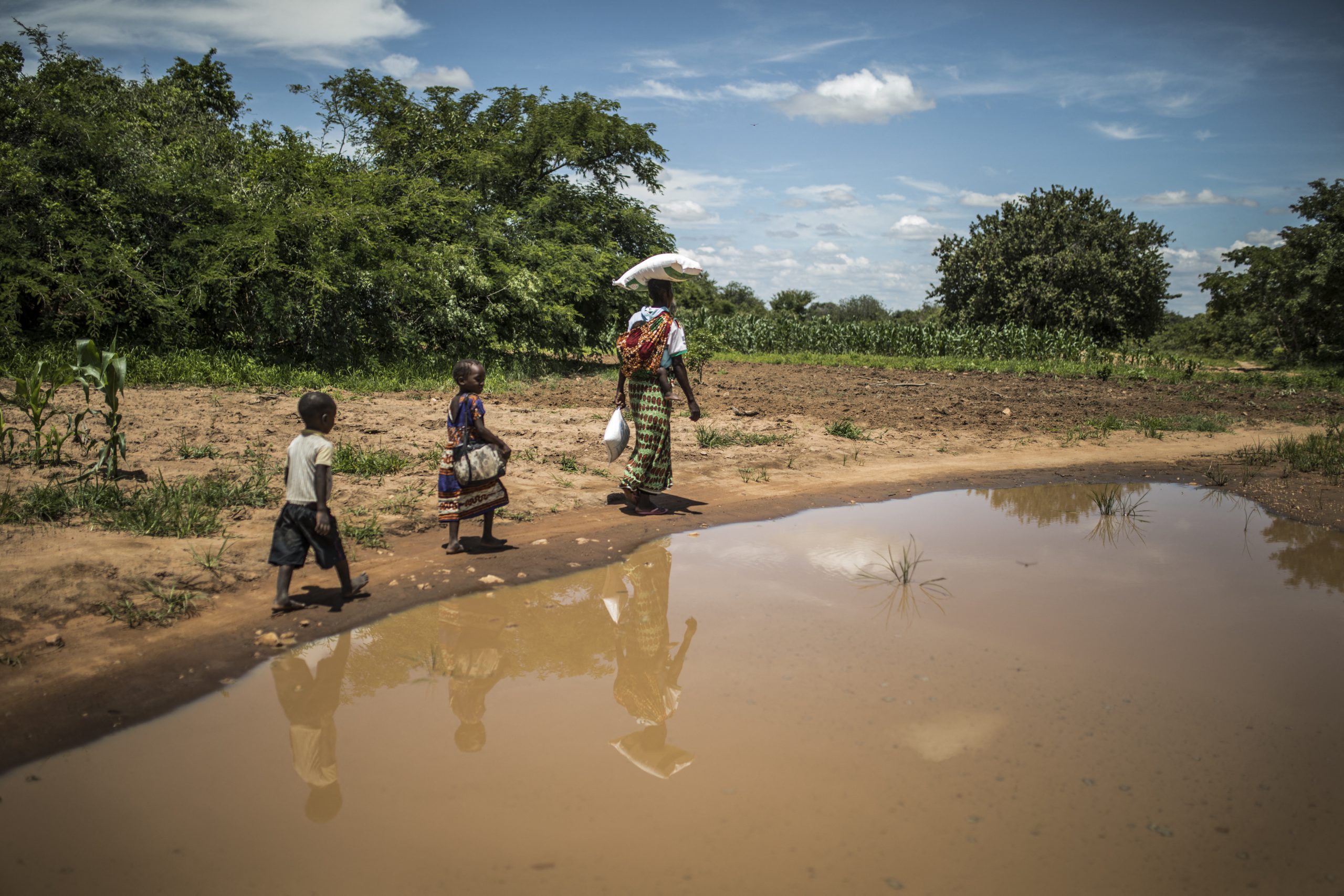Zambia has vast freshwater resources, including major tributaries of the Zambezi River and significant lakes such as Bangweulu, Mweru and Tanganyika. The country receives moderate rainfall, averaging 967mm annually, with the south getting about 600mm and the north 1,336mm.
Despite this abundance, climate change, population growth, insufficient infrastructure and governance issues threaten water security. Good governance, innovative thinking and political will are essential to unlocking Zambia’s development potential and ensuring water equality for its citizens.

Funding is desperately needed to meet the needs of the 2.3 million severely food-insecure people in Zambia. Photo by Guillem Sartorio/AFP
The World Bank reports that only two-thirds of Zambians have adequate access to clean water, with rural areas facing even greater difficulties because of insufficient infrastructure. This deficit stems from inadequate funding and poor maintenance. Zambia has five major dams and about 1 000 small dams that are crucial for agriculture, livestock, and domestic water storage.
Despite existing water sector framework documents, the lack of data on dam conditions hinders strategic water resource planning, regulation efforts and future investments in multi-purpose dam development.
Zambia’s energy sector uses the most water annually — about 60 billion cubic metres — although much is non-consumptive because it is used to generate hydropower. Rain-fed agriculture uses about 12 billion cubic metres while irrigated agriculture uses about 3.3 billion cubic metres a year. The household sector is the third-largest water user.
Unequal water distribution affects health, education and commerce. Women and girls are responsible for household water collection in rural areas and this takes them away from school and work.
Contaminated water is the third leading cause of death for children under five. Diseases such as cholera, dysentery and typhoid are common. Since 2023, Zambia has seen nearly 700 cholera deaths and 20,000 infections, making it the epicentre of the 2024 outbreak in Southern Africa.
Zambia’s agriculture sector contributes 9.2% to GDP and employing nearly 85% of the workforce. But water issues undermine its productivity.
Despite abundant water reserves and 523,000 hectares suitable for irrigation, getting water remains difficult, especially where surface water is scarce.
Only about 4% of arable land is irrigated, making crops highly vulnerable to droughts and water shortages. Staple crops such as maize, rice and wheat suffer during critical growth stages, reducing yields.
Government efforts to promote agriculture face problems because water demand for irrigation exceeds estimated supply. High costs of infrastructure for water capture and distribution also hinder commercial agricultural projects.
Should Zambia fully exploit its water resources for consistent irrigation, it could offset the effects of unpredictable rainfall and boost agricultural output.
Ensuring a consistent water supply (with sustainable storage options) will safeguard food production as well as secure livelihoods for the many Zambians employed in agriculture.
Zambia’s water crisis has harmed the local environment and biodiversity. Since 2018, severe droughts have reduced crop productivity, pushing farmers to produce charcoal.
This shift has led to rapid deforestation in hardwood forests and protected reserves, a major driver of biodiversity loss. Weak law enforcement, insufficient funding and lack of institutional capacity in forestry, fisheries and wildlife sectors further exacerbate the issue.
Mining operations have also adversely affected Zambia’s water security. Pollution from some of these activities has contaminated ground and surface water sources, notably the Kafue River and Mushishima stream in Chingola District.
This has led to severe water shortages and environmental degradation for residents, visibly altering the once clear Kafue River to a green hue. Indigenous fish are harmed and biodiversity faces threats from toxic discharge by mining, paper mills and fertiliser factories. The pollution of water sources is expected to persist as demand for critical minerals such as copper and cobalt drives the establishment of new mines.
Raising awareness of environmental and social governance issues is crucial, along with companies establishing their own guidelines to tackle these concerns.
The cabinet endorsed the Mineral Regulations Commission Bill, which aims to establish the Minerals Regulation Commission. This commission will strengthen regulation, monitor compliance and enforce rules in the mining sector to tackle problems such as environmental degradation and illegal mining.
Declining food availability drives up prices, stressing the finances of vulnerable households. Reduced employment opportunities in rural farming areas exacerbate poverty and hinder economic resilience and progress.
Limited access to water can also spark local resource conflicts. Despite efforts to enhance water availability through facilities like public boreholes and pumps, they can inadvertently alter existing power dynamics and create new tensions between and in communities.
According to the Competing for Water Programme, in Namwala district, water access often hinges on local power relations rather than actual need, resulting in uneven distribution of benefits that fuel social tensions and conflict.
In 1994, the government of Zambia introduced the National Water Policy, a pivotal moment for the country’s water sector.
This policy aimed to tackle emerging problems and modernise water management approaches. Recognising the need for ongoing adaptation, the policy underwent revision in 2010 to establish a comprehensive framework for sustainable development, management, and use of water resources. Through these strategic divisions and policy revisions, Zambia aims to manage water complexities while meeting evolving population and economic demands.
The Water Act 198 provides oversight on water rights but operates in restrictive boundaries, focusing solely on issuing and monitoring these rights.
But its limitations have hindered the effective use of water resources, affecting their control, quality and availability.
Importantly, the Act neglects critical issues such as shared watercourses and groundwater management, allowing unregulated exploitation of privately-owned groundwater resources. This oversight perpetuates a lack of monitoring and regulation in groundwater use, limiting the identification of suitable areas for agricultural and industrial development.
Several factors hinder the effective management of water resources, beyond deficiencies in institutional and legal structures. Insufficient data and inadequate information systems concerning water resources pose significant obstacles to monitoring efforts.
Addressing the water security problems in Zambia requires a multifaceted approach, including establishing a national water resources authority and adopting a comprehensive framework for managing both surface water and groundwater.
Improving maintenance and optimising critical infrastructure such as pump stations and water treatment plants is essential.
Investment in irrigation and drainage systems can offset productivity losses in rain-fed farming. Implementing climate-smart agricultural techniques and promoting climate-resilient crops can mitigate the effect of irregular rainfall patterns.
Protecting natural water systems through enhanced biodiversity conservation efforts is also critical.
Addressing capacity gaps, law enforcement failures and funding deficiencies in the conservation sector is crucial. Future mining projects should consider water scarcity issues in cost-benefit analyses, and the “polluter pays” principle should mandate those responsible for pollution to bear its costs, thus encouraging environmental responsibility.
Revising existing water protection legislation, such as the Water Act, to address shortcomings in managing shared watercourses and groundwater is necessary. Policymakers must also bridge the data gap through more adept investment allocation and skills development. Finally, addressing gender inequalities in clean water access and acknowledging the diverse effect of water scarcity on men and women are integral to water management strategies that will be effective for the future.
This article first appeared in Mail & Guardian.
Leleti Maluleke is a Researcher for our Human Security and Climate Change programme. She completed her Bachelor of Political Science in Political Studies in 2017, and her Honours in International Relations in 2018 at the University of Pretoria. She started her career at International SOS in the Security Services department as a Political Risk and Security Intern. Socially, her countries of interests include Mozambique, Zimbabwe, Zambia and Malawi.












